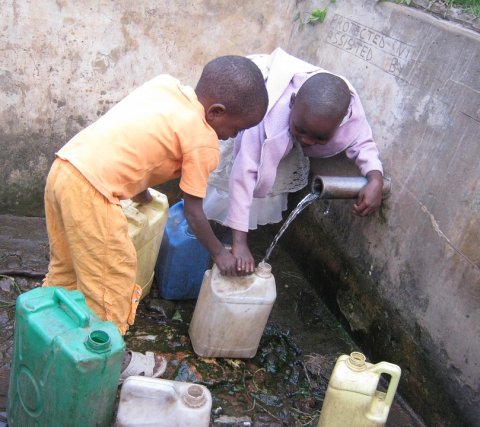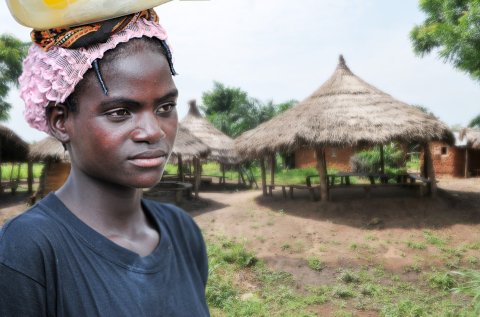Water, sanitation and hygiene for all means health for all
Today is World Water Day, an opportunity to raise awareness and take action to address the global Water, Sanitation and Hygiene (WASH) crisis by highlighting the critical role of WASH to the ambition of Sustainable Development Goal 3, healthy lives for all.
What is WASH?

WASH is the provision of access to a safe water supply, appropriately constructed sanitation infrastructure ensuring safe disposal of human excreta, and health education and promotion of hygiene (personal and household practices aimed at preserving cleanliness and health).
Infrastructural components such as provision of public taps or household latrines are unlikely to be beneficial investments without accompanying behavioural change and hygiene promotion.
A good reason to be optimistic
Encouragingly, the importance of WASH services is being championed at the highest level.
Joint action on WASH and health is an issue rising up the global agenda.
There is increasing recognition across sectors that the global community's ambition of health and wellbeing for all will need a significant political commitment not just from countries but from multiple sectors, including WASH.
WASH is critical to good health
When efforts to improve health recognise the importance of environmental determinants like WASH, we see dramatic gains in a population’s health outcomes.
Handwashing with soap (HWS) is one of many key hygiene behaviours, but it is at the core of health promotion and hygiene behaviour change. It has been linked to a 16-23% reduction in risk of acute respiratory infection and a 50% reduction in pneumonia.
Repeated episodes of diarrhoea in early life can have a long-term and irreversible impact on a child’s nutritional status and development potential. Hand washing with soap has been linked to a substantial reduction in neonatal infections and up to 48% reduction in risk of endemic diarrhoea.
Infection-related infant deaths could be reduced by 27% by improving handwashing practices in healthcare facilities. HWS has also been found to reduce school absenteeism by 43%.
WaterAid works with partners across the health sector to improve health outcomes. Below are three examples of areas we are collaborating on:
Hygiene promotion through immunisation – changing behaviours and promoting health
In Nepal, new-borns visit immunisation clinics at least five times in the first nine months of their lives. This makes an excellent opportunity for health workers to promote good hygiene behaviours that will improve children’s and families’ health.
By embedding hygiene behaviour change in Nepal’s routine immunisation programme, we are transforming the way the hygiene and public health sectors work together.
Behaviour change interventions in this programme showed that the hygiene promotion effectively improved all key hygiene behaviours – from 2% during baseline to 53% after one year of implementation. It also increased immunisation coverage, reducing drop-out and vaccine wastage rate and helping to target the hard-to-reach.
The capacity of the health workers and female community health volunteers to run innovative hygiene promotion increased.
WASH in healthcare facilities – safer maternal and new-born health

Access to WASH in communities, schools and in health care centres is fundamental to improving health outcomes.
Yet, a 2015 WHO and UNICEF survey found that 38% of healthcare facilities surveyed did not have access to a basic water source, and 35% lacked the materials necessary for people to wash their hands effectively. If frontline healthcare workers aren’t able to keep facilities clean and prevent infections, their capacity to deliver safe, effective, and dignified care is undermined.
WaterAid Malawi is working with the Ministry of Health and partners to improve access to, and use of, sustainable water, sanitation and hygiene services in communities and health facilities, by focussing on the role WASH can play in maternal and child health.
The challenges are multifaceted so the approach to the problem must be too. The programme is strengthening the health sector by integrating WASH with maternal and newborn health policy, building capacity for infection prevention and supporting improved service provision in 16 health care facilities across three districts.
It aims to improve waste management within the health centres by providing incinerators, placenta pits, and well-lined waste pits, and encouraging infection prevention by providing clients with adequate bathrooms and toilets.
In combination with this, there is a push for hygiene behaviour change around cleaning, disinfection, sterilisation and personal protective equipment.
The project is also promoting good sanitation and hygiene behavioural change in the villages surrounding the healthcare facilities.
WASH and neglected tropical diseases – leading the way on joint working
The neglected tropical diseases (NTD) sector has achieved significant strides forward on action to better integrate WASH services with public health interventions. WASH and NTD actors have joined forces to accelerate progress in controlling and eliminating these diseases.
WASH is closely linked to the spread of each of the neglected tropical diseases and plays a critical role in disease prevention as well as for morbidity management. In 2015 the WHO published its first WASH for NTDs Global Strategy 2015-2020.
It provided a clear plan to accelerate progress on addressing NTD Roadmap targets through increased inter-sectoral WASH-NTD collaboration and integration of approaches, through guidance to countries and NTD partners to prioritise WASH in conjunction with other NTD control strategies.
A good example of this are tools such as the All you need for F&E: A practical guide to partnering and planning by ICTC developed by the International Coalition for Trachoma Control (ICTC) for the Queen Elizabeth Diamond Jubilee Trust and UK Department for International Development funded programmes in Chad, Ethiopia, Kenya, Malawi, Tanzania, Uganda and Zambia.
Closer working between the sectors in the form of integration and collaboration has become more common.
This has been aided through the development of joint planning tools, messaging and initiatives to develop joint WASH and NTD monitoring processes. By sharing goals, indicators and data, the shared opportunities between partners is made clear which in turn helps to facilitate collaboration.
Looking forward
WASH is the cornerstone of prevention of infections and the key mechanism that can be implemented to reduce environmental contamination.
It is also essential for morbidity management and safe, dignified health care. To be successful in efforts to combat infectious diseases, such as NTDs, we need to ensure cross-sector dialogue and action between the diverse actors and ministries responsible for improving public health.
We look forward to seeing all these efforts continue to be scaled up and adopted by more partners working on WASH and health.
Essentially, World Water Day reminds us that only by achieving WASH for all can we realise the vision of health for all.